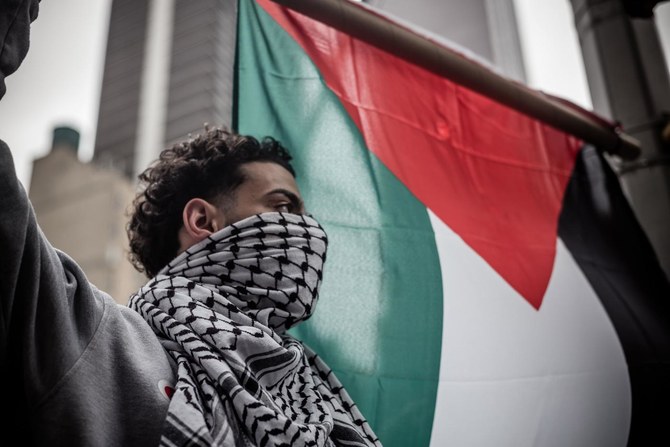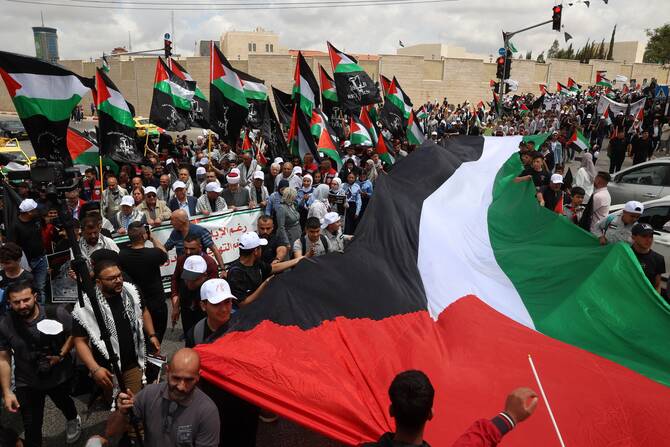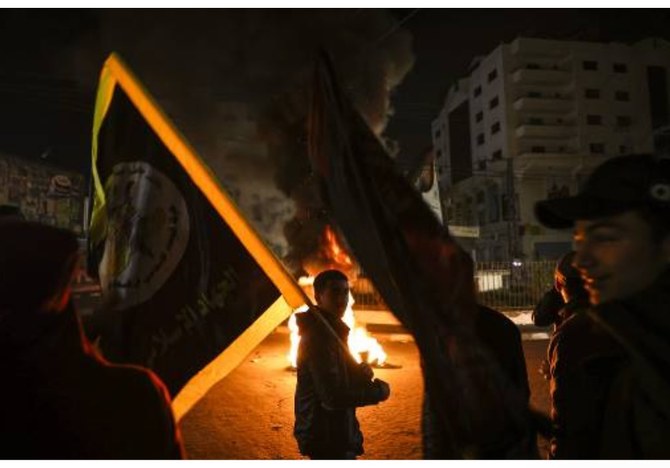According to the report, which was released on the 75th anniversary of the Nakba — the day the Israeli military expelled hundreds of thousands of Palestinians from their homes — 51 percent of Palestinians surveyed preferred a two-state solution to end the decades-long conflict.
The findings also show that 13 percent wish to be integrated into Israel, merging themselves under Israeli leadership and becoming Israeli citizens.
With that, 11 percent said they chose to remain under the Israeli occupation with neither the Palestinian Authority as a governing state nor them having Israeli citizenship.
“Palestinians are in a state of despair; 75 years after the Nakba, most Palestinians have lost all faith in any political process to deliver any meaningful solution,” Chris Doyle, the director of the London-based Council for Arab British Understanding, told Arab News.
The data shows that nearly two-thirds of Palestinians (64 percent) express their unreadiness to compromise over Jerusalem. Yet dividing the city into east (the Palestinian state capital) and west (Israeli capital) is the most popular alternative with 35 percent of the oldest group backing this option.
Since the Oslo Accords in 1993, the two-state solution has been proposed as a means to end the Palestinian-Israeli conflict and the occupation.
Doyle said: “It is not clear anymore what a two-state solution means? Would it be a proper sovereign state of Palestine based on 1967 lines with Jerusalem as a capital?”
Based on the survey, the least favorable option was integrating Gaza into Egypt and the West Bank into Jordan, with citizens acquiring passports of each country respectfully.
In terms of fair mediation, Palestinians have lost most confidence in the US after the Trump administration moved the American embassy to Jerusalem with several US officials reiterating that they view the city as the capital of Israel.
The YouGov survey found that only 23 percent still view the US as a fair mediator while 59 percent do not. Russia, meanwhile, scores the highest as fairest, at 25 percent, but closely followed by the EU at 22 percent, China at 18 percent and Japan at 11 percent.
Should a state be formed, Palestinian citizens expect their government to prioritize economic development and job creation — with 41 percent ranking this as a priority.
The West Bank and the Gaza strip continue to rely on foreign aid to make do. While the economy has progressed at 4 percent in the past two years, the World Bank expects a slump in the Palestinian economy, calling the situation bleak in 2023.
Internal security and border control ranked at 30 percent, while health care was ranked least important at only 5 percent, despite poor standards in health sector.
In 2022, UNICEF required $39 million in humanitarian funding to provide and sustain life-saving services for women and children in Palestine.
Health services continue to be overstretched and disrupted. An estimated 1.5 million living between the Gaza Strip and the West Bank, including 700,000 children, have limited access to primary health care. Moreover, insufficient water supply to households, poor sanitation and limited public services exposes 1.36 million Palestinians to disease risks. The COVID-19 pandemic alone claimed 5,622 civilian lives.
As to why peace initiatives have failed so far in the eyes of Palestinian residents, 31 percent believe it is due to Israeli intimidation and their building of settlements over annexed Palestinian lands; 20 percent believe is it the mistakes and lack of leadership of the Palestinian authority, and 8 percent have put the blame on the sabotage of dialogue by Palestinian armed militias.






















